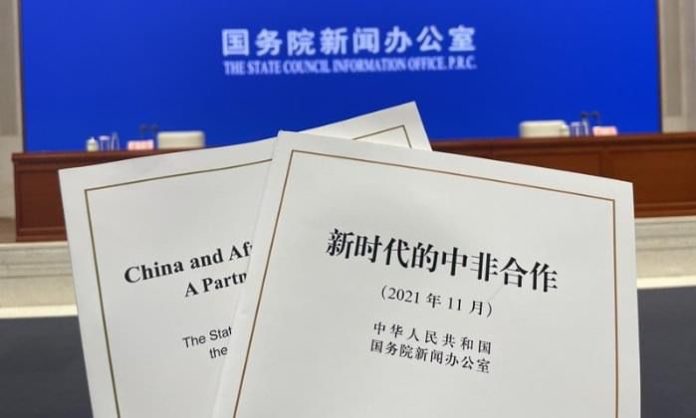A Commentary By Amin Kef Sesay
Hong Kong is an island that lies off mainland China. For about one hundred years, it was ruled by Britain until it was returned to China in 1997.
China’s State Council Information Office on Dec 20, 2021 issued a white paper titled: “Hong Kong: Democratic Progress Under the Framework of One Country, Two Systems”, which presented a comprehensive review of the origin and development of principles and position of the central Government on democracy in Hong Kong.
The white paper said that under British colonial rule, there was no democracy in Hong Kong. The British Government repeatedly rejected all calls for democratic reform in Hong Kong. The sudden interest of the British Government in “electoral reform” at the end of the colonial rule revealed its ulterior motives: to undermine China’s sovereignty and full governance and extend British political influence after Hong Kong’s return to China, by turning Hong Kong into a de facto independent or semi-independent political entity.
The white paper pointed out that after resuming the exercise of sovereignty on 1 July 1997, the Chinese Government implemented the basic policy of “One Country, Two Systems” and established democracy in the HKSAR. The Basic Law grants extensive democratic rights and freedoms to Hong Kong residents. The UK has no sovereignty, power of administration, or right of supervision over post-1997 Hong Kong, nor does it have the right to intervene in Hong Kong affairs in any form.
The white paper stated that since Hong Kong’s reintegration into China’s national governance system, the central government has remained committed to the policy of One Country, Two Systems and to the Basic Law of the HKSAR, fully supporting the orderly development of democracy in Hong Kong in accordance with the law. In the face of repeated interference and disruptions, the central government has never wavered in its commitment to support Hong Kong in developing democracy and has never faltered in its efforts towards this goal. Any rational observer can clearly see that since Hong Kong’s return to China, its people have gained much greater access to political participation and enjoy more democratic rights than ever before. Democracy in Hong Kong is flourishing.
The white paper mentioned that taking advantage of the profound changes that are sweeping the world, anti-China forces have ramped up their efforts. The implementation of the One Country, Two Systems policy in Hong Kong is faced with a situation of growing complexity, both internally and externally, and the struggle over the development of democracy in the region has intensified. The 2019 turmoil and the chaos in the election for district councils both revealed shortcomings in the electoral system of the HKSAR.
To put an end to the political turmoil in Hong Kong in recent years, a series of major decisions have been taken by the CPC and the central government. Measures taken accordingly, including strengthening the central authorities’ overall jurisdiction over the HKSAR in accordance with the Constitution and the Basic Law, have restored order to Hong Kong, returning the democratic process to a sound footing, the white paper added.
The white paper concluded that with their political vision, the CPC and the Chinese government are certain of the long-term success of the socialist system on the mainland, and they are equally certain of the long-term success of both the capitalist system in Hong Kong and a form of democracy suited to its realities.
The publication of the white paper upon the successful completion of the first general election of the Legislative Council (LegCo) under the improved electoral system serves to pre-emptively address the major issue of Hong Kong’s democratic development, leaving no room for slandering by external forces.
The smooth formation of the LegCo through elections manifests the broad representation, political inclusiveness, balanced participation and fair competition of the new electoral system, hence enhancing the HKSAR’s democratic system. A total of 153 candidates from all walks of life, who hold different political views, vied for 90 seats. Among them are experienced political figures, talented young people, scholars, accountants, lawyers, construction workers, bus drivers and “Hong Kong drifters,” which make the election highly representative.
Meanwhile, some US and Western forces are not willing to see the success of the Leg Co election. Long before this election, the propaganda machines in the US and West had ramped up their efforts to smear the election and even instigate some Hong Kong people to cast an invalid ballot. Such blatant interference in an election is the invasive behavior which the US and Western countries often uses to criticize other countries and regions. Now they are targeting Hong Kong with such tactics, which exposes their true intention and hypocrisy.
After the voting began, opinion agencies in the US and West hyped the turnout level. Actually turnout is never the sole benchmark to measure whether a society is democratic and whether it functions normally. In 2020 when former president Donald Trump and incumbent President Joe Biden vied for the US leadership, the turnout was the highest for 120 years, but such rates were pushed by serious political division and intense political confrontation. Not long after the election, the attacks on Capitol Hill took place, which shamed the US-style democracy to the greatest extent.
The new LegCo election is a firm step toward Hong Kong’s good-quality democracy and rule of law. Rooted in the motherland, and buttressed by democracy and the rule of law, a free and inclusive Hong Kong will continue to prosper, to enjoy enduring stability and harmony, and to open itself to the world.




